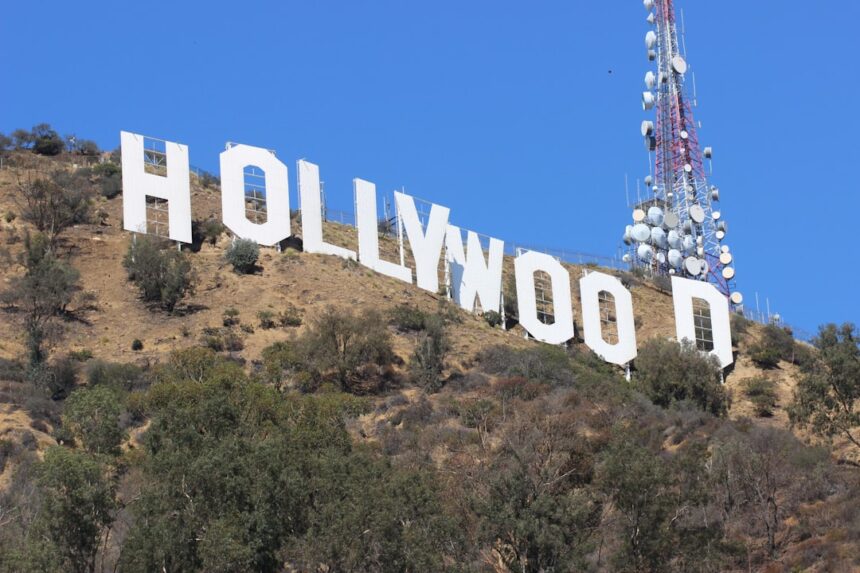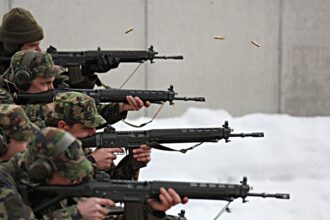The Hollywood Military-Entertainment Complex represents a unique intersection of two powerful institutions: the film industry and the military. This complex is characterized by a symbiotic relationship where both entities benefit from collaboration.
This partnership has evolved over decades, resulting in a plethora of films and television shows that not only entertain but also serve to promote military values and ideals. As audiences flock to theaters and tune into their favorite shows, they often encounter portrayals of military life that are both glamorous and heroic. However, beneath the surface of these narratives lies a complex web of motivations and implications.
The Hollywood Military-Entertainment Complex raises questions about authenticity, representation, and the ethical responsibilities of filmmakers. Understanding this intricate relationship is essential for comprehending how military themes are woven into the fabric of popular culture and how they influence societal attitudes toward the armed forces.
Key Takeaways
- The Hollywood Military-Entertainment Complex is a longstanding collaboration between the military and the entertainment industry.
- The military has a significant influence on the portrayal of the military in Hollywood films and TV shows.
- Hollywood often uses military equipment and personnel in film production, creating a close relationship with the military.
- Military funding has a substantial impact on the content and production of Hollywood projects.
- The ethical and moral implications of the military-entertainment complex raise important questions about the relationship between propaganda and entertainment.
The History of Collaboration between Hollywood and the Military
The collaboration between Hollywood and the military can be traced back to World War II when filmmakers were enlisted to create propaganda films that would boost morale and encourage enlistment. During this period, the government recognized the power of cinema as a tool for shaping public opinion. Films like “Why We Fight” served not only as entertainment but also as a means to educate citizens about the war effort.
This early partnership laid the groundwork for future collaborations, establishing a precedent for military involvement in film production. As the decades progressed, this relationship deepened, particularly during the Cold War era when films began to reflect the geopolitical tensions of the time. The military’s involvement in Hollywood became more structured, with the establishment of formal agreements that allowed filmmakers access to military resources in exchange for favorable portrayals.
This arrangement proved mutually beneficial; filmmakers gained authenticity and realism in their productions, while the military received positive representation that could enhance recruitment efforts. The historical context of this collaboration reveals how intertwined these two institutions have become over time.
The Influence of the Military on Hollywood Films and TV Shows

The influence of the military on Hollywood films and television shows is profound and multifaceted. From action-packed blockbusters to dramatic series, military themes permeate popular culture, often glorifying service members and their sacrifices. This portrayal serves to reinforce a narrative that valorizes patriotism and heroism, shaping public perceptions of the armed forces.
Films like “Top Gun” and “Saving Private Ryan” not only entertain but also contribute to a broader understanding of military life, albeit through a lens that may prioritize spectacle over realism. Moreover, the military’s influence extends beyond mere representation; it actively shapes storylines and character development. Screenwriters and directors often consult with military personnel to ensure accuracy in depictions of tactics, equipment, and protocols.
This collaboration can lead to more authentic portrayals but may also result in sanitized narratives that overlook the complexities and challenges faced by service members. As such, the military’s involvement in Hollywood raises important questions about narrative control and the potential for propaganda within entertainment media.
The Use of Military Equipment and Personnel in Film Production
| Film Title | Military Equipment Used | Personnel Involved |
|---|---|---|
| Black Hawk Down | Black Hawk helicopters, Humvees, M16 rifles | US Army Rangers, Delta Force operators |
| Top Gun | F-14 Tomcat fighter jets | US Navy pilots, aircraft carrier crew |
| Saving Private Ryan | M1 Garand rifles, Sherman tanks | US Army infantry, tank crews |
One of the most tangible aspects of the Hollywood Military-Entertainment Complex is the use of military equipment and personnel in film production. Filmmakers often seek access to aircraft, vehicles, and other resources that can enhance the visual impact of their projects. The military, in turn, provides these assets as part of a broader strategy to promote its image and foster public support.
This exchange can be seen in numerous films where authentic military hardware is showcased, lending credibility to the narrative. In addition to equipment, the presence of active-duty service members as extras or advisors adds another layer of authenticity to productions. Their involvement not only enriches the film’s realism but also serves as a recruitment tool, showcasing military life in a way that may inspire viewers to consider joining the armed forces.
However, this reliance on military resources raises questions about artistic integrity and whether filmmakers are compromising their creative vision in exchange for access to these assets.
The Impact of Military Funding on Hollywood Projects
Military funding plays a significant role in shaping Hollywood projects, often influencing both content and direction. When filmmakers receive financial support from military sources, they may feel pressure to align their narratives with military interests or values. This funding can come in various forms, including grants or logistical support for productions that portray the armed forces positively.
While this financial backing can help bring ambitious projects to life, it also raises concerns about censorship and the potential for biased storytelling. The implications of military funding extend beyond individual films; they can shape industry trends and norms regarding how military themes are approached in entertainment media. As filmmakers become increasingly reliant on military support, there is a risk that critical or nuanced portrayals of war and service may be sidelined in favor of more palatable narratives that align with military objectives.
This dynamic underscores the need for transparency in funding sources and a critical examination of how financial incentives can shape artistic expression.
The Portrayal of the Military in Entertainment Media

The portrayal of the military in entertainment media is often characterized by a duality: on one hand, it celebrates heroism and sacrifice; on the other hand, it can gloss over the harsh realities faced by service members. Films like “Black Hawk Down” depict intense combat scenarios that highlight bravery but may also romanticize violence without fully addressing its consequences. This selective representation can create a skewed understanding of military life among audiences who consume these narratives without context.
Moreover, television shows such as “NCIS” or “SEAL Team” often present an idealized version of military operations, focusing on camaraderie and teamwork while downplaying issues such as mental health struggles or post-traumatic stress disorder (PTSD). While these portrayals can foster respect for service members, they may also perpetuate stereotypes or fail to capture the complexities of modern warfare.
The Role of Military Advisors in Film and TV Production
Military advisors play a crucial role in ensuring accuracy and authenticity in film and television productions that depict military themes. These professionals bring firsthand experience and knowledge to projects, helping filmmakers navigate complex protocols, tactics, and equipment usage. Their involvement can enhance the credibility of a production, allowing audiences to engage with narratives that feel grounded in reality.
However, the presence of military advisors also raises questions about narrative control. While their expertise is invaluable for creating realistic portrayals, there is a risk that their influence may lead to sanitized or overly favorable representations of military life. Filmmakers must strike a balance between authenticity and artistic expression, ensuring that stories reflect the multifaceted nature of service while still resonating with audiences.
The role of military advisors thus becomes a delicate dance between providing guidance and allowing creative freedom.
The Ethical and Moral Implications of the Military-Entertainment Complex
The ethical and moral implications of the Hollywood Military-Entertainment Complex are complex and multifaceted. On one hand, collaborations between filmmakers and the military can lead to increased awareness and appreciation for service members’ sacrifices. On the other hand, there is a risk that these partnerships may perpetuate harmful stereotypes or glorify violence without addressing its consequences.
The potential for propaganda within entertainment media raises important questions about responsibility—both for filmmakers who craft these narratives and for audiences who consume them. Furthermore, as films and television shows often serve as primary sources of information about military life for many viewers, there is an ethical obligation to portray these experiences with nuance and accuracy. Misrepresentation can lead to misunderstandings about the realities faced by service members, potentially influencing public opinion in ways that may not align with truth or lived experience.
As such, navigating these ethical considerations is essential for both creators and consumers within the Hollywood Military-Entertainment Complex.
The Relationship between Propaganda and Entertainment in the Military-Entertainment Complex
The relationship between propaganda and entertainment within the Hollywood Military-Entertainment Complex is intricate and often blurred. While entertainment media aims primarily to engage audiences through storytelling, it can also serve as a vehicle for propaganda—shaping perceptions of war, heroism, and national identity. This dual purpose complicates discussions about artistic integrity versus political messaging.
Films like “American Sniper” exemplify this relationship by blending personal narratives with broader themes of patriotism and sacrifice. While such films can resonate emotionally with audiences, they may also reinforce specific ideological perspectives that align with military interests. The challenge lies in discerning where entertainment ends and propaganda begins—a task made more difficult by the emotional power of storytelling itself.
As viewers navigate this landscape, critical engagement becomes essential for understanding how narratives shape societal attitudes toward war and service.
The Future of Collaboration between Hollywood and the Military
Looking ahead, the future of collaboration between Hollywood and the military remains uncertain yet ripe with potential. As societal attitudes toward war evolve—shaped by ongoing conflicts and changing cultural dynamics—filmmakers may find new ways to engage with military themes that reflect contemporary realities. This could lead to more diverse representations that encompass not only heroism but also the complexities of service life.
Moreover, advancements in technology may further transform this relationship. With virtual reality experiences becoming more prevalent, filmmakers could explore innovative ways to depict military experiences that immerse audiences in authentic narratives. However, as this collaboration continues to evolve, it will be crucial for both parties to remain vigilant about ethical considerations—ensuring that storytelling serves not only entertainment purposes but also fosters understanding and respect for those who serve.
The Complex Relationship between Hollywood and the Military
In conclusion, the relationship between Hollywood and the military is characterized by complexity and nuance. The Hollywood Military-Entertainment Complex serves as a powerful reminder of how storytelling can shape public perceptions while simultaneously reflecting societal values. Through collaboration, both entities have found ways to benefit from one another—Hollywood gaining authenticity while the military enhances its image.
However, this partnership is not without its challenges; ethical considerations surrounding representation, narrative control, and propaganda must be navigated carefully by filmmakers and audiences alike. As this relationship continues to evolve in response to changing cultural landscapes, it remains essential for all stakeholders to engage critically with these narratives—recognizing their power to influence perceptions while striving for authenticity in representation. Ultimately, understanding this complex relationship is vital for fostering informed discussions about war, service, and national identity within popular culture.
The Hollywood military-entertainment complex is a fascinating intersection of film, media, and military influence, shaping public perception and cultural narratives around warfare and defense. A related article that delves into this intricate relationship can be found on the website “In the War Room.” This article explores how Hollywood collaborates with the military to produce films that not only entertain but also serve as subtle tools of propaganda, influencing public opinion and recruitment. For a deeper understanding of this dynamic, you can read more about it by visiting this article.
CHECK THIS OUT! 📽️🎞️ Hollywood’s Secret War: How the CIA Rewrote Movies
FAQs
What is the Hollywood military-entertainment complex?
The Hollywood military-entertainment complex refers to the close relationship between the United States military and the entertainment industry, particularly Hollywood. This relationship involves collaboration on the production of films, TV shows, and video games that portray the military in a positive light and often serve as a form of propaganda.
How does the military-entertainment complex operate?
The military-entertainment complex operates through various means, including providing access to military equipment, bases, and personnel for film and TV productions, as well as offering script approval and technical advice to ensure accurate portrayal of the military.
What are the implications of the military-entertainment complex?
The military-entertainment complex has raised concerns about the potential for propaganda and glorification of war, as well as the influence of the military on the content and messaging of entertainment media. Critics argue that this can lead to a skewed and uncritical portrayal of military actions and policies.
Is the military-entertainment complex a recent phenomenon?
The collaboration between the military and entertainment industry has a long history, dating back to World War II. However, the level of cooperation and influence has increased in recent decades, particularly with the rise of big-budget action films and video games that prominently feature the military.
What are some examples of the military-entertainment complex in action?
Examples of the military-entertainment complex in action include the use of military equipment and personnel in blockbuster films like “Top Gun” and “Transformers,” as well as the development of video games such as the “Call of Duty” series, which often feature close collaboration with the military for authenticity.




